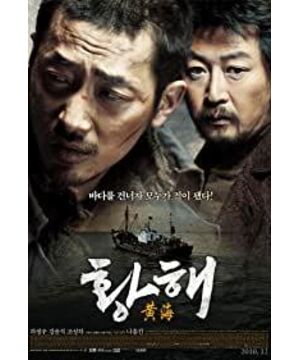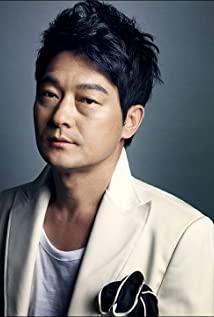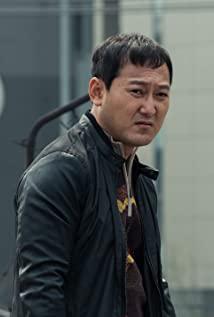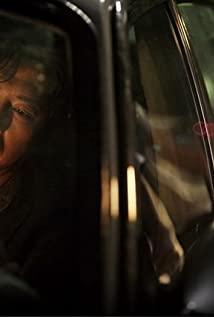The bones are received from the father, and the blood is received from the mother. Before watching "The Yellow Sea", I couldn't help but think of the beginning of "Blood and Bone" by Cui Yangyi. In the narration of "I" (the author), on the ship in the Seto Inland Sea, the young father and a group of Korean compatriots saw Osaka, and there were many chimneys on the land. They cheered for the sight before them, but it was unimaginable. future destiny. "Blood and Bone" is about the Koreans who went to Japan to make a living. It is a family story. There are a lot of characters and a strong sense of history. "Yellow Sea" tells the story of Chinese Koreans who were hired to kill people and smuggled to South Korea to find their wives. The film omits the historical nepotism, the details are numerous but the clues are clear. The hot pursuit of flying cars and naked knives meet, all of which are neatly shot and have become Luo Hongzhen's personal and commercial characteristics. The two movies are one Korean a day, but the characters are all intricate, and the brutality in the bones is unforgettable. The large-scale violence and sex, and the undisguised desire for survival, all exposed the plight of marginalized groups and the unique national character. This is not an exaggeration, it is not anecdotal, it is life, the life of a nation.
If "Blood and Bone" corresponds to an autobiographical novel, then "Yellow Sea" corresponds to a social news; if "Blood and Bone" of family history is a blunt weapon, then "Yellow Sea", which focuses on individuals, is a sharp weapon. The movie is like a sharp blade, picking up the junction between China and the Korean Peninsula, and gently scratching the wound on the interlaced area, and then peeling and dissecting. The story of "Yellow Sea" is the same as the case of "The Chaser". It can be tested by reality. After artistic processing, it can be presented with the help of the mature film industry. Probably feel that the accumulated shooting material is good and good, a perfectionist like Luo Hongzhen put down his concerns about the length of the film and was reluctant to cut it. The film is more than 150 minutes long, which is considered long for a literary film.
According to the director's original intention, "The Yellow Sea" and "The Chaser" are closely linked, and the film can be called "The Murderer" or "The Murderer". To imitate the theory of yellow journalism, a similar title can trick many viewers into watching. In fact, the name "Yellow Sea" has a higher artistic conception. First of all, the Yellow Sea is a geographical term. Since the land road is separated from North Korea, stowaways can only walk on water, and the Yellow Sea is a must. This sea is not a strip of water, but it may bury them there. Secondly, most of the seas are blue, and the yellow sea also refers to the illegal identity of the protagonist Jiunan, who is frightened and still fighting. In the end, maybe Luo Hongzhen didn't want the audience to leave their impression on "The Chaser", and he didn't even want to look back, even though he was defeated, he was still honored.
From the perspective of screenwriting, "Yellow Sea" and "Chasers" are both looking for people and murdering people, but the specific process is very different, such as the timing of the appearance of blood. It took almost an hour for "Yellow Sea" to create a visual impact. Blood flowed on the stairs, and the murder scene was undisguised. And a few minutes ago, Jiu Nan and the driver were still working downstairs, unaware of the situation - this section simply grabbed the hearts of the audience. In "The Chaser", Luo Hongzhen made the murderer appear early, and it didn't take long for him to develop his criminal methods, cold and ruthless, and the impact came early. Obviously, watching "The Yellow Sea" requires patience, it is not like the storm of "Chasers", it is violent.
The film's foreshadowing of Yanji also aroused repercussions. In such a mainstream Korean commercial film, it is rare to see the customs of China. What's more, except for the flaws of a few supporting roles, Yanji in "The Yellow Sea" is so real. In a country that can't produce gang movies, when the audience sees familiar street scenes, hears familiar language, and faces a down-and-out taxi driver, they must be excited. You must know that "Yellow Sea" not only gave birth to "car masters", but also mahjong masters and dialect masters, Ha Jung-woo and Kim Yun-suk showed their talents.
"The Yellow Sea" mainly revolves around two intertwined clues, namely, the search for a wife and a crime, and various things involving gangs and the police in the middle. Finding a wife is blood, crime is bone, bones support the body, and flesh and blood fills the body. Jiunan's restlessness, confusion and despair, and even repeated dreams, all belong to the blood side and focus on expressing emotions. The intricate murder case was not caused by a shocking conspiracy, but an inconspicuous love murder. Disaster for women, for women. Women are the props that are displayed, and men are the pawns to be played with. In this setting, "The Yellow Sea" is very similar to "The Chaser", but Jiu Nan has more personal emotions, or no matter how many animals there are, he is more like a person than other characters. On the big theme, "Yellow Sea" has gone beyond the level of Korean society and the incompetence of the police, and directly targeted the Korean ethnic group living in the Northeast.
As for the bone side, it is duel with swords and axe, slaughter and rhythm, speeding stunts, and serial pursuits. Like Mr. Mian's real faceless appearance, using a thick dog's femur as a weapon, and one enemy in the cabin, these passages create a strong contrast and the effect is shocking. In "The Chaser", Luo Hongzhen arranged for Park Chan-wook's hammer to face off against Kim Ki-duk's golf club. With hand-held photography and a long lens, the viewing experience is excellent. As long as you are brave enough, anything can become a murder weapon in the world. Rather than saying that Luo Hongzhen has an unusual and crazy obsession with violent scenes, it is better to say that he pays attention to expressiveness and sense of picture. "sweat".
Like some classic movies, like a gambler who likes to gamble, "Yellow Sea" arranges the unknown Jiu Nan to be involved in the storm. Luo Hongzhen made a lot of preparations for this, from the mahjong table, the taxi to the whereabouts of his wife. This man at the end of the road is indeed guilty but seemingly innocent, hateful and pitiful. The two men opposite him, one is domineering, like a strong wind; the other is full of mistakes and failures. Both of these characters are relatively face-to-face, and there is no need for discussion. The three men mixed together, and many people thought of "dog bites dog". The dog is the narration at the beginning and the ruthless metaphor of the whole film. In fact, the origin of the story between Korean movies and dogs, just watch Kim Ki-deok's "Unknown Recipient", which almost tells all about the unknown identity, physical damage and the pain of survival. In contrast, "Yellow Sea" changed the core and put on an outer packaging, which saved the conscience while throwing money. The cut-in method and ending arrangement of "The Yellow Sea" may be difficult to satisfy the Korean audience. However, as far as the Chinese Koreans in "Yellow Sea" are concerned, it is also the sorrow of the Koreans, colonization, division, and double-teaming. The survival instinct and desire for export can only be infinitely amplified.
Like "Chasers," "Yellow Sea" also schedules preannounced deaths. Jiunan saw the ruthless throwing of corpses on the smuggling boat. That scene revealed that the Korean stowaways were like ants, and it also foreshadowed the fate of Jiunan. In the end, due to excessive blood loss, Jiunan gradually fell into a coma on the boat. The "wife" who thought about it day and night turned into ashes. Known or unknown deceased, they drained their blood, turned to ashes, and were buried deep in the Yellow Sea together. 【International Herald Tribune】
View more about The Yellow Sea reviews











